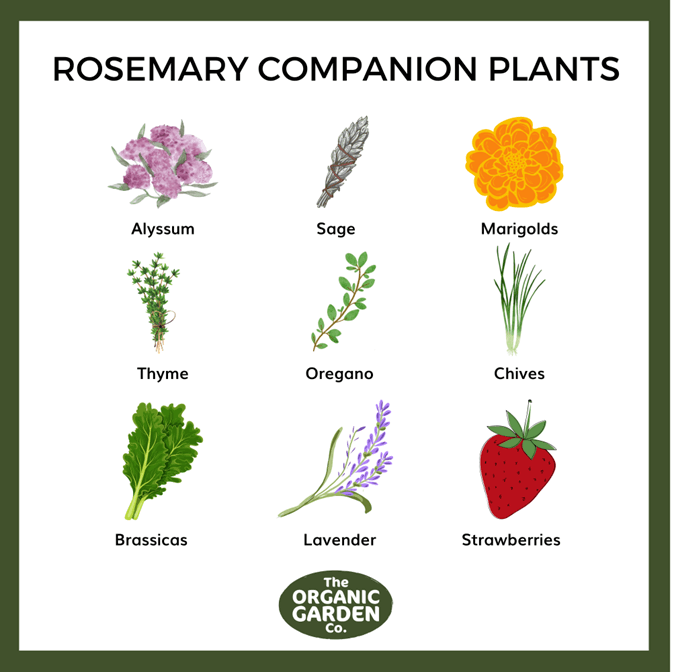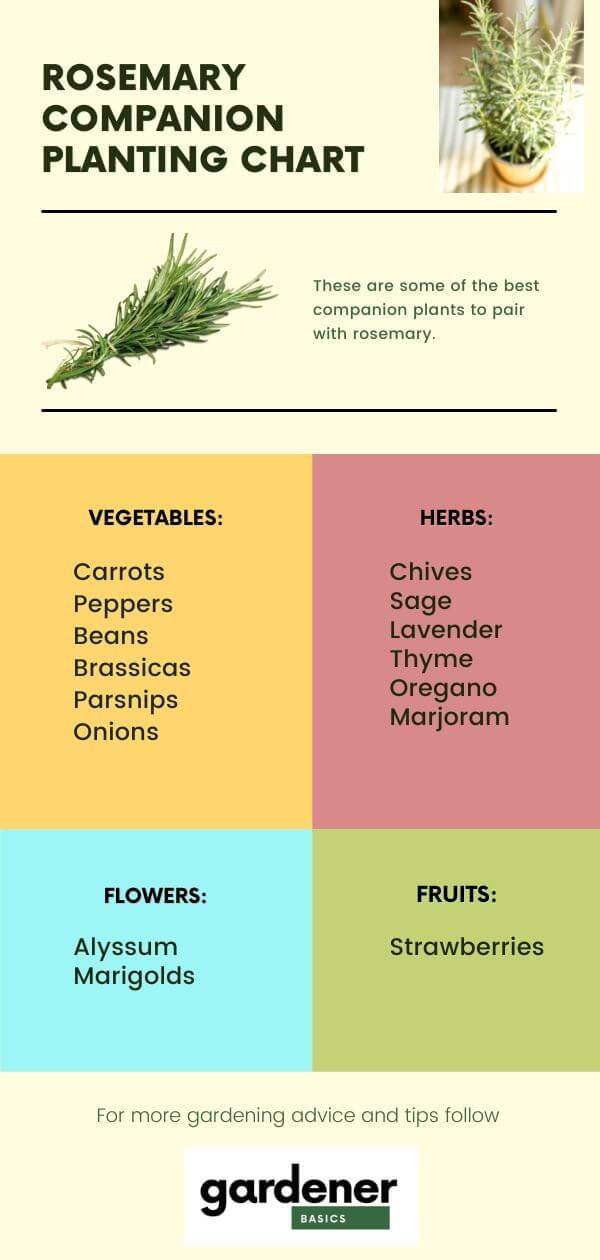Rosemary Companion Plants: The Ultimate Guide To Which Vegetables To Grow Together
Rosemary Companion Plants: The Ultimate Guide to Which Vegetables to Grow Together
Rosemary is a popular herb that is known for its fragrant leaves and versatile uses in cooking. But did you know that rosemary can also be a beneficial companion plant for other vegetables? By planting rosemary near certain vegetables, you can help to improve their growth, repel pests, and even improve the flavor of your crops.
In this blog post, we will discuss the best companion plants for rosemary, as well as some plants that you should avoid planting near it. We will also provide some tips on how to plant and care for rosemary companion plants.
The Benefits of Companion Planting
Companion planting is a gardening technique that involves planting certain plants together in order to benefit each other. There are many different benefits to companion planting, including:
- Improved growth and yields: Companion plants can help to improve the growth and yields of other plants by providing them with nutrients, water, and shade. For example, rosemary can help to improve the growth of tomatoes by deterring pests and attracting pollinators.
- Pest and disease control: Companion plants can help to repel pests and diseases from other plants. For example, rosemary has a strong scent that can help to deter pests such as cabbage moths and tomato hornworms.
- Improved flavor: Companion plants can also help to improve the flavor of other plants. For example, rosemary can add a subtle, woodsy flavor to vegetables such as carrots and tomatoes.
Best Companion Plants for Rosemary
Here are some of the best companion plants for rosemary:
- Broccoli: Rosemary can help to deter pests such as cabbage moths and aphids from broccoli plants.
- Carrots: Rosemary can help to improve the flavor of carrots and also deter pests such as carrot flies.
- Cucumbers: Rosemary can help to improve the flavor of cucumbers and also deter pests such as cucumber beetles.
- Kale: Rosemary can help to deter pests such as cabbage moths and aphids from kale plants.
- Peas: Rosemary can help to improve the growth of pea plants and also deter pests such as pea moths.
- Potatoes: Rosemary can help to deter pests such as potato beetles and nematodes from potato plants.
- Spinach: Rosemary can help to improve the flavor of spinach and also deter pests such as aphids.
- Tomatoes: Rosemary can help to improve the growth of tomato plants and also deter pests such as tomato hornworms.
Plants to Avoid Planting Near Rosemary
While there are many plants that can benefit from being planted near rosemary, there are also a few plants that you should avoid planting near it. These plants include:
- Basil: Basil and rosemary are both Mediterranean herbs, but they do not make good companions. Basil can attract pests that can harm rosemary plants.
- Mint: Mint is a very aggressive plant that can quickly take over your garden. It is best to avoid planting mint near rosemary or any other plants.
- Onions: Onions and garlic can release sulfur compounds that can stunt the growth of rosemary plants.
- Pumpkins: Pumpkins can compete with rosemary plants for water and nutrients.
- Cucumbers: Cucumbers can attract pests that can harm rosemary plants.
How to Plant and Care for Rosemary Companion Plants
When planting rosemary companion plants, it is important to follow the same care instructions for both plants. This includes planting them in the same type of soil, in the same amount of sunlight, and watering them at the same frequency.
In addition to following the same care instructions, there are a few other things you can do to help your rosemary companion plants thrive. First, you can mulch around the plants to help retain moisture and suppress weeds. You can also fertilize the plants regularly with a balanced fertilizer.
With a little care and attention, you can enjoy the benefits of companion planting with rosemary and other vegetables. By planting the right plants together, you can help to improve their growth, repel pests, and even improve the flavor of your crops.
Rosemary is a versatile herb that can be used in a variety of dishes, but it's also a great companion plant for vegetables. Some of the best vegetables to plant near rosemary include:
- Carrots: Carrots and rosemary help to repel each other's pests. Carrots can also help loosen the soil around the rosemary roots, making it easier for the plant to absorb water and nutrients.
- Broccoli: Rosemary can help to improve the flavor and growth of broccoli, and it can also repel pests such as cabbage moths and cabbage loopers.
- Cabbage: Rosemary and cabbage have different soil requirements, which can help to prevent the spread of diseases. Rosemary's strong scent can also help to deter cabbage moths and cabbage loopers.
- Tomatoes: Rosemary is believed to improve the flavor and growth of tomatoes, and it can also repel pests such as the tomato hornworm. However, it's important to note that tomatoes and rosemary should not be planted too close together, as rosemary can compete with tomatoes for water and nutrients.
For more information about rosemary companion plants, visit Gardenia Inspiration. This website provides a comprehensive list of vegetables that can be planted near rosemary, as well as information about the benefits of companion planting.
FAQ of rosemary companion plants vegetables
Question 1: What vegetables should I plant rosemary next to?
Answer: Rosemary is a good companion plant for many vegetables, including:
- Brassicas: Rosemary's strong aroma helps to repel pests that can damage brassicas, such as cabbage moths and aphids.
- Carrots: Rosemary can help to improve the flavor of carrots.
- Eggplant: Rosemary can help to protect eggplants from pests and diseases.
- Garlic: Rosemary and garlic have a synergistic effect, meaning that they work better together than they do individually. They can help to repel pests and diseases, and they can also improve the flavor of each other's crops.
- Green beans: Rosemary can help to improve the growth and yield of green beans.
- Onions: Rosemary and onions have a similar aroma, which can help to deter pests. They can also help to improve the flavor of each other's crops.
- Potatoes: Rosemary can help to protect potatoes from pests and diseases.
- Tomatoes: Rosemary can help to improve the flavor of tomatoes and protect them from pests and diseases.
- Zucchini: Rosemary can help to improve the growth and yield of zucchini.
Question 2: What are some vegetables that I should avoid planting near rosemary?
Answer: There are a few vegetables that you should avoid planting near rosemary, including:
- Beans: Rosemary can inhibit the growth of beans.
- Cucumbers: Rosemary can attract pests that can damage cucumbers.
- Melons: Rosemary can stunt the growth of melons.
- Peas: Rosemary can inhibit the growth of peas.
- Spinach: Rosemary can attract pests that can damage spinach.
Question 3: How far apart should I plant rosemary and other vegetables?
Answer: The exact distance that you should plant rosemary and other vegetables apart will depend on the size of the plants. However, as a general rule of thumb, you should plant rosemary at least 2 feet away from other vegetables. This will give the rosemary enough space to grow and spread, and it will also help to prevent the spread of pests and diseases.
Question 4: What are some other benefits of companion planting with rosemary?
Answer: In addition to helping to repel pests and diseases, companion planting with rosemary can also offer a number of other benefits, including:
- Improved soil quality: Rosemary can help to improve the drainage and aeration of soil, which can benefit other plants.
- Increased pollination: Rosemary's flowers are attractive to pollinators, which can help to increase the pollination of other plants in your garden.
- Enhanced flavor: The strong aroma of rosemary can enhance the flavor of other vegetables.
Question 5: What are some tips for companion planting with rosemary?
Answer: Here are a few tips for companion planting with rosemary:
- Do your research: Before you start companion planting, it's important to do your research and learn which plants grow well together. This will help you to create a successful garden.
- Pay attention to the size of the plants: When choosing companion plants for rosemary, it's important to pay attention to the size of the plants. Rosemary can grow quite large, so you'll need to choose companion plants that won't be overshadowed by it.
- Consider the needs of the plants: When choosing companion plants for rosemary, it's also important to consider the needs of the plants. For example, if rosemary needs full sun, you'll need to choose companion plants that also need full sun.
- Experiment: The best way to learn about companion planting is to experiment. Try different combinations of plants and see what works best for you.
Image of rosemary companion plants vegetables
Here are 5 different images of "rosemary companion plants vegetables" from Pinterest:
- Rosemary and cabbage. Rosemary's aroma masks the scent of brassicas and keeps pests at bay. Plant rosemary near any plants in the cabbage family: cabbage, broccoli, cauliflower, kale, Brussels sprouts, turnips, kohlrabi, rutabaga, and radishes.

- Rosemary and tomatoes. Although rosemary and tomatoes are both Mediterranean herbs, they should not be planted together. Rosemary's strong aroma can stunt the growth of tomatoes.

- Rosemary and beans. Rosemary is a good companion plant for beans because it helps to repel pests such as aphids and whiteflies.

- Rosemary and carrots. Rosemary can help to improve the flavor of carrots and also repel pests such as carrot rust fly.
- Rosemary and lavender. Rosemary and lavender are both Mediterranean herbs that thrive in full sun and well-drained soil. They can be planted together in a herb garden or in a pot on a sunny patio.


Post a Comment for "Rosemary Companion Plants: The Ultimate Guide To Which Vegetables To Grow Together"